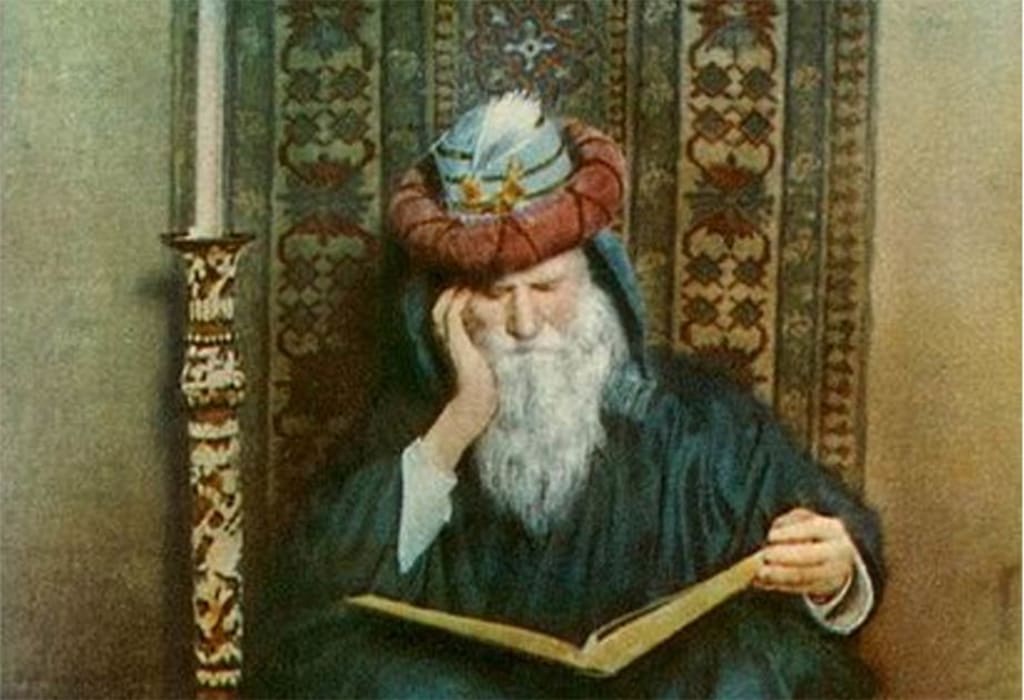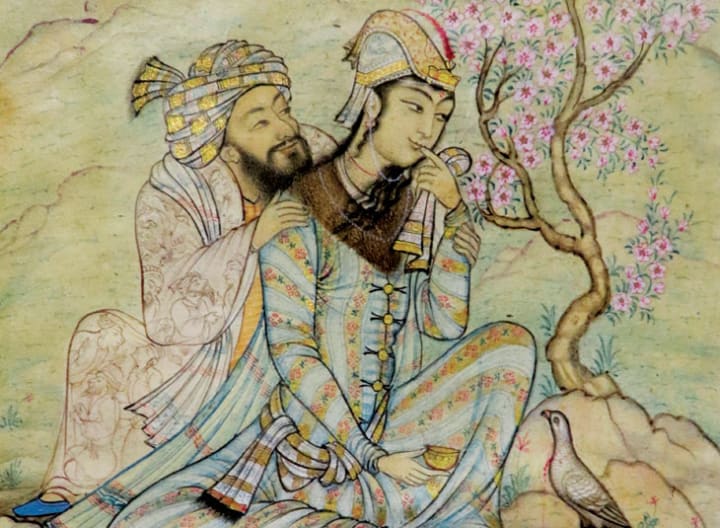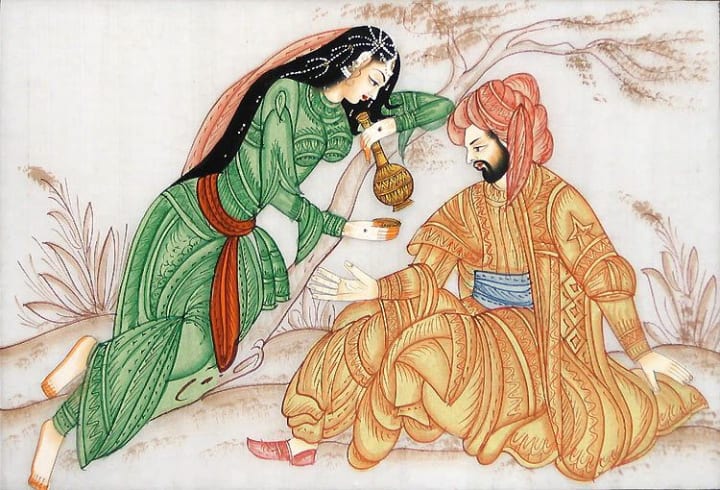Who is Omar Khayyam?
The Life Story, Poetry, and Philosophy

Omar Khayyam, a renowned Persian poet, mathematician, and philosopher, is celebrated for his remarkable contributions to literature and his profound insights into the mysteries of life. Born in the 11th century in Nishapur, Iran, Khayyam's poetry has transcended time and cultural boundaries, leaving a lasting impact on the world. This article delves into the life story of Omar Khayyam, explores his poetic genius, and delves into the philosophical themes present in his works.
Early Life and Education
Omar Khayyam was born in 1048 in Nishapur, a city in northeastern Iran. From an early age, he showed an exceptional aptitude for learning, particularly in mathematics and astronomy. Recognizing his talents, Khayyam received an excellent education in science, philosophy, and literature, studying under renowned scholars of the time.
Poetic Genius
While Khayyam's mathematical and scientific achievements were significant, it is his poetic prowess that has garnered him worldwide acclaim. His poetry, primarily written in Persian, is characterized by its eloquence, depth, and contemplation of life's existential questions.

The Rubaiyat
Khayyam's most celebrated work is "The Rubaiyat" (Quatrains), a collection of around a thousand four-line poems. These quatrains, also known as rubaiyat, touch upon themes of love, mortality, the fleeting nature of existence, and the pursuit of meaning and happiness. The verses are rich in metaphors, symbolism, and vivid imagery, allowing readers to reflect on the complexities of the human condition.
Philosophical Themes
Khayyam's poetry often reflects his philosophical ponderings, exploring themes such as the transient nature of life, the pursuit of pleasure, the concept of fate, and the limitations of human knowledge. One of the recurring ideas in his works is the notion of carpe diem, encouraging individuals to seize the present moment and find joy in life's fleeting pleasures.

Skepticism and Mysticism
Khayyam's poetry exhibits a blend of skepticism and mysticism. He questions religious dogma, societal norms, and the inevitability of fate, inviting readers to ponder the true nature of existence and the limits of human understanding. Khayyam's verses often challenge traditional religious beliefs, emphasizing the importance of personal reflection and the exploration of individual truths.
Legacy and Influence
Although Khayyam's poetry was not widely recognized during his lifetime, his work gained popularity centuries after his death. The translation of "The Rubaiyat" by Edward FitzGerald in the 19th century introduced Khayyam to the Western world, sparking a renewed interest in his writings.
Khayyam's influence extends beyond literature. His mathematical achievements, including contributions to algebra and geometry, continue to be studied and appreciated by scholars worldwide. Moreover, his philosophical reflections on the nature of existence and the pursuit of meaning have resonated with countless readers, making him a timeless figure in the realm of literature and philosophy.
Omar Khayyam, a renowned Persian poet, mathematician, and philosopher, is celebrated for his remarkable contributions to literature and his profound insights into the mysteries of life. Born in the 11th century in Nishapur, Iran, Khayyam's poetry has transcended time and cultural boundaries, leaving a lasting impact on the world. This article delves into the life story of Omar Khayyam, explores his poetic genius, and delves into the philosophical themes present in his works.
Early Life and Education
Omar Khayyam was born in 1048 in Nishapur, a city in northeastern Iran. From an early age, he showed an exceptional aptitude for learning, particularly in mathematics and astronomy. Recognizing his talents, Khayyam received an excellent education in science, philosophy, and literature, studying under renowned scholars of the time.
Poetic Genius
While Khayyam's mathematical and scientific achievements were significant, it is his poetic prowess that has garnered him worldwide acclaim. His poetry, primarily written in Persian, is characterized by its eloquence, depth, and contemplation of life's existential questions.

The Rubaiyat
Khayyam's most celebrated work is "The Rubaiyat" (Quatrains), a collection of around a thousand four-line poems. These quatrains, also known as rubaiyat, touch upon themes of love, mortality, the fleeting nature of existence, and the pursuit of meaning and happiness. The verses are rich in metaphors, symbolism, and vivid imagery, allowing readers to reflect on the complexities of the human condition.
In "The Rubaiyat," Khayyam often expresses a sense of melancholy, acknowledging the transient nature of life and the inevitability of death. He invites readers to contemplate the brevity of human existence and the importance of finding joy and meaning in the present moment. Khayyam's verses encourage individuals to embrace life's pleasures, pursue love, and seek wisdom while acknowledging the uncertainty and impermanence of all things.
Philosophical Themes
Khayyam's poetry often reflects his philosophical ponderings, exploring themes such as the transient nature of life, the pursuit of pleasure, the concept of fate, and the limitations of human knowledge. One of the recurring ideas in his works is the notion of carpe diem, encouraging individuals to seize the present moment and find joy in life's fleeting pleasures.
While Khayyam's verses celebrate the beauty of life and the enjoyment of earthly delights, they also carry a sense of skepticism and a questioning of societal norms and religious dogma. Khayyam challenges traditional notions of piety, encouraging individual introspection and personal reflection. His poems suggest that true wisdom and understanding lie in the exploration of one's own truths rather than conforming to established beliefs.
Skepticism and Mysticism
Khayyam's poetry exhibits a blend of skepticism and mysticism. He questions religious dogma, societal norms, and the inevitability of fate, inviting readers to ponder the true nature of existence and the limits of human understanding. Khayyam's verses often challenge traditional religious beliefs, emphasizing the importance of personal reflection and the exploration of individual truths.
His skepticism does not reject spirituality but rather encourages a more nuanced and personal approach to faith and belief. Khayyam suggests that the path to truth and enlightenment lies in the exploration of one's own spiritual journey, transcending rigid dogmas and embracing the mystery of existence.
Legacy and Influence
Although Khayyam's poetry was not widely recognized during his lifetime, his work gained
Conclusion
Omar Khayyam, the multidimensional figure from 11th-century Persia, left an indelible mark on the world through his poetry, mathematics, and philosophical musings. His ability to navigate profound philosophical questions with lyrical eloquence continues to captivate readers from various cultures and generations. Khayyam's poetic genius and philosophical insights provide a profound window into the human condition, reminding us to embrace life's beauty, ponder its mysteries, and seek our own truth in the transient nature of existence.
About the Creator
Reina
Hi my name is Reina and I love writing. here I want to write about my favorite subjects like history, food, art, interior design and music for you.
Enjoyed the story? Support the Creator.
Subscribe for free to receive all their stories in your feed. You could also pledge your support or give them a one-off tip, letting them know you appreciate their work.






Comments
There are no comments for this story
Be the first to respond and start the conversation.